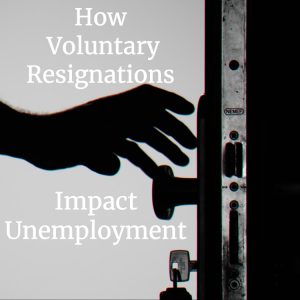Many employers are unfamiliar with how voluntary resignations can impact unemployment. They often assume that employees are ineligible for unemployment benefits when they quit. Unfortunately, determining unemployment eligibility is not always clear-cut.
State adjudicators must determine the final incident that led to the employee’s separation. This is done by evaluating the reason given by the claimant and reviewing the documentation provided by the employer. There are a number of circumstances where benefits may be awarded as in these five common voluntary resignation cases.
Forced Resignation
In forced resignation cases, an employer will force an employee to resign by providing two options: resignation or termination. The employee will often resign in hopes of a better chance of finding new employment.
In this scenario, the state does not view the final incident to be a voluntary resignation. The employer is still considered the moving party to the separation. Meaning, the claimant would not have voluntarily resigned their position without the ultimatum of the employer. When responding to an unemployment claim in a case of forced resignation, it is important to include all documentation which led to the decision to terminate the claimant in order to avoid a costly unemployment claim.
Voluntary Resignations due to Medical or Family Circumstances
Unemployment benefits are intended for those who have become unemployed through no fault of their own. When employees quit for medical reasons they may be eligible to receive unemployment benefits. It is important to determine whether they took reasonable steps to protect their job, like asking for or inquiring about medical leave.
Medical reasons go beyond personal illness and extend to family members as well.
If employees need to take care of a seriously ill or disabled family member, their job may be protected under FMLA. If not, in order to receive unemployment benefits, the employee must be able to seek and accept work.
Sometimes reasons for quitting aren’t related to medical issues. Occasionally, employees will quit when their spouses relocate for another job. This is known as a trailing spouse provision and allows benefits to be paid in the interest of keeping the family together.
Voluntary Resignations Due to Domestic Violence
Employees who must flee from domestic violence may be eligible to receive benefits even if employers have a domestic violence policy in place. In this case, having a policy or claiming that the employee didn’t disclose the domestic violence doesn’t necessarily protect employers from a charge to their account.
Because of the complicated nature of the subject, employees may receive benefits even if employers do everything possible to keep employees safe. It’s possible that being in a specific location could cause the victim harm. Employers are often ill-equipped to protect victims and explain that the victim didn’t tell them or provide documentation. Regardless of the reason, when safety is a factor, the state will almost always side with employees when proof of domestic violence is presented.
Employees who provide the state with proof of the abuse such as a court order, police report, or hospital documentation meet the burden necessary to receive benefits.
Voluntary Resignations for Good Reason Caused by the Employer
Changes to employees work schedule, position, or hiring agreement can sometimes cause voluntary resignations. This is true even if the hiring agreement states that the employees must be flexible in their time and tasks. Employees who have been working the day shift for years have a reasonable expectation that they’ll continue on this shift even if their hiring agreement specifically indicates they will work nights. Changing their shift to nights could cause personal issues, such as childcare, necessitating a resignation.
Sometimes employers try to help employees with performance issues by demoting them, changing their role, or assigning them another shift. Employees in this situation are often surprised that the hiring agreement has changed and will voluntarily resign with good cause. Despite good intentions, generosity can often backfire on employers.
Finally, changes to the environment and culture can cause voluntary resignations. Issues can be related to co-workers, desk location, and even temperature to name a few. If employees have problems with things in the work environment, employers must show that they made a reasonable effort to resolve them.
Just because employees quit doesn’t mean they can’t collect unemployment insurance. Voluntary resignations that result in benefits paid to employees isn’t uncommon. Due diligence and having the right documentation in place can reduce the likelihood of having to pay a claim that isn’t warranted. To learn more about how we can help eliminate unnecessarily paying unwarranted claims, click here.

